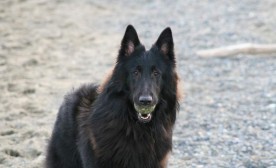Good training can’t happen without failures but too many can make it frustrating and no fun for either the human or the dog. If failures are going to happen, why not learn from them and use them to make things better? You only fail if you didn’t learn something from the experience.
Dogs, Memory, and Learning – Why History Is Important
Every time we work with our dog, the history of all of our experiences with this dog follow us. For better or for worse, our dog remembers. Your dog’s expectations of you and your time together will depend on how you have shaped those memories.
Dog Training from Start to Finished
Many dog owners train their dogs until they seem to “get it” and think they are done. Dog trainer Eric Brad suggests that there are other important aspects to consider when training your dog such as are proximity, distractions, repetition, and the ability to work at a distance and in different environments.
Two Important Words Of Dog Training Advice
Sometimes, when we think we are helping our dogs to learn, we are actually getting in the way of their success.
Defending Your Dog
In spite of our very human desire to integrate our dogs into every facet of our lives, we may be creating more problems for our dogs than we can solve.
Frustrated Fido: Understanding People Isn’t Easy
Dog trainer Eric Brad reminds us that good communication with our dogs relies on positive reinforcement, consistency and fairness. Being observant and clear about what we are saying will lead to success, he says.
Demystifying the Behaviour of Dogs
Applying training principles gleaned from behavioural science led Eric Brad to enjoy a more rewarding, less tension-filled relationship with his dogs. “What a wonderful surprise to find that living like this with my dogs can, in itself, be Positive Reinforcement for both the dogs and the humans,” writes Eric.
Finding Out the Truth About Your Dog
There is plenty of “common knowledge” about dogs that is just plain wrong, and it gets repeated and passed on every day. Eric Brad looks at how to move past our assumptions and discover the truth about the dogs we live with.
Dog Training? Who’s Training Who?
Humans like the affection of dogs. We find it reinforcing when they come to us for petting and attention. Once they find something that annoys us, they can be masters at using it to get us to do things in order get them to stop doing it. It’s cause and effect, consequences dictating behaviour. And they know it. As Jean Donaldson put it in her book Culture Clash, “Dogs do what works.”
How Do We Talk About Dog Training?
“Lately,” writes Eric Brad, “it seems to me that some of the terms we use to describe dogs and our relationship with them can do more harm than good. While they can bring people to agreement on some level, do they keep us from discussing the real issues that these terms can mask?”
- « Previous Page
- 1
- …
- 16
- 17
- 18
- 19
- 20
- …
- 24
- Next Page »










